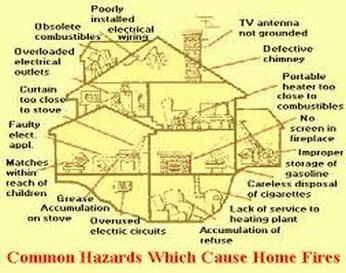|
A fire in the home is most people’s worst nightmare. A fire breaking out when the family are asleep is an even more frightening thought. After all, it could prove to be lethal. There are many products on the market these days, that will help prevent fire in your home but there are quite a few ways that you can prevent a fire happening in the first place.
• Get a routine Each time you go out or go to bed, you should have a routine that you can rely on. It may be as simple as checking the electric sockets in each room have been turned off, ovens switched off, that cigarettes have been properly extinguished and all doors are closed. It could also include hanging your outside door keys in a place of easy access. If a fire were to break out when you were asleep, time would be of the essence. You would need to evacuate your home quickly. Fumbling for the right key could mean the difference between life and death. • Fire prevention Make sure that your home has fully working fire alarms installed. Check them regularly and replace batteries as soon as necessary. Too many people install a fire alarm and then forget to check that it is working. Some people remove the battery when it needs replacing to quiet the warning beep. It is all too easy then to forget to replace it. Consider investing in a small basic fire extinguisher and perhaps a fire blanket. It is never advisable to tackle a blaze yourself but it could be that you have no alternative. A fire blanket could help you leave a fire filled building safely. Overall though it is better to prevent a fire in your home, than have to tackle one. • Checking your home and goods for faults, safety and potential fire hazards Maybe the electrics of your home are old and no longer safe. Conduct a full safety test around your home. Make a list of what needs to be done. If there are appliance plugs with incorrect fuses or loose wires put them right. If necessary, contact an appropriate professional to make your home safe. • Consult your local fire officers Your local fire officers will be happy to offer fire safety advice. It will save them time and money in the end. • Good working practices in the home Have a family get together, or meeting, to discuss good fire safety practices around the home. Many fires occur when a person is cooking, has been smoking or an appliance, such as a hairdryer, is not turned off and stored properly. If a smoker cannot quit smoking try to make sure that they at least smoke outdoors. This will help improve the air quality in your home and prevent a cigarette fire from occurring. Having a family meeting can make sure that everyone understands the danger of fire and how he or she can prevent it. Assess your cooking skills to ensure that you do not leave tea towels near to cooker flames and the like. Always use a fireguard and never dry clothes near a naked flame. • Plan your escape All households should have some idea of how they would evacuate their home if they needed to. With the best will in the world, you can never say that you will not have a fire in your home. An electrical fire could start and take hold quickly. Check what windows could be opened wide enough for you to escape. If none is available, have some windows changed. If windows have locks, the keys must be within easy reach. • Overall Fire safety in the home is mainly common sense. Start as you mean to go on. This means putting fire safety measures in place and continuing to follow them. Once you have an evacuation plan you may need to update it from time to time. Keep on top of fire safety, as you know it makes sense.
0 Comments
|
Archives
March 2020
Categories
All
|


 RSS Feed
RSS Feed








